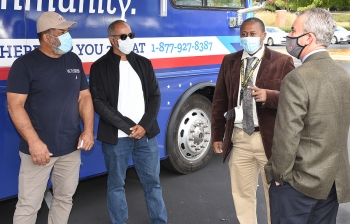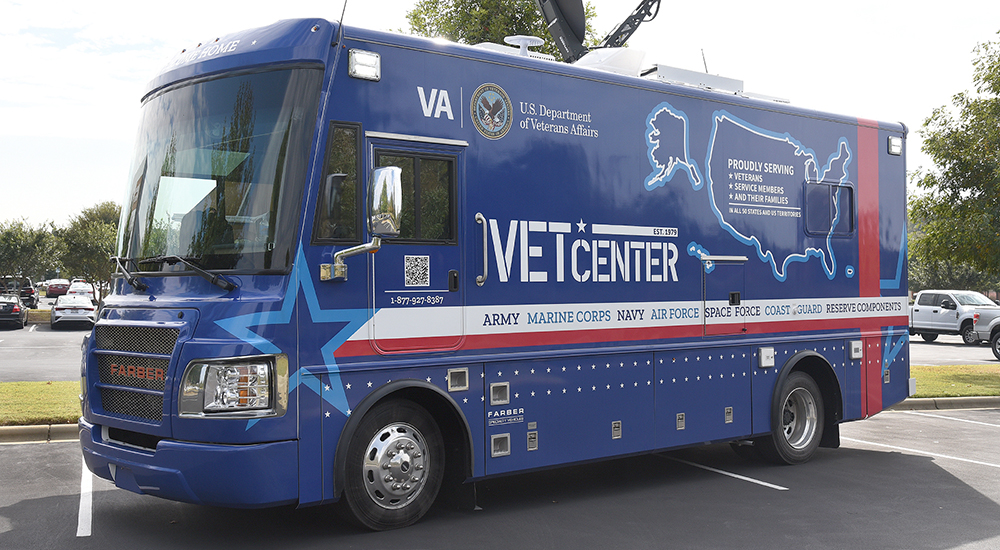A Charlotte Vet Center Mobile Health Clinic recently made a stop at the Charlotte VA Health Care Center en route to Puerto Rico. During its stop, leaders from Salisbury VA Health Care System and Charlotte Vet Center talked partnerships, goals and how VA and Vet Centers benefit one another.
Vet Centers, which began in 1979, serve combat Veterans. Its staff see Veterans in their brick-and-mortar facility, but much of its work is done inside the community.
“We do outreach in rural areas and do counseling as needed,” said Air Force Veteran Lance Nelson, the Veterans Outreach program specialist for Charlotte Vet Center. “It’s our job to get into the community and find those needs.”
Staff treats the entire family
The Vet Center is comprised of social workers, psychologists, licensed professional counselors, and now licensed marriage and family therapists. The staff treat the entire family, not just the Veteran.

Vet Center director Chauncey McLeod and Salisbury VA director Joseph Vaughn meet with Vet Center staff.
“We work with combat Veterans and Veterans who have military sexual trauma,” Nelson said. “We also provide bereavement counseling for family members who lost a loved one while serving on active duty.”
Nelson’s aim is to increase knowledge among the community and VA about Vet Center programs and how the two organizations benefit one another.
“My goal is to make sure VA frontline workers are aware of the Vet Center programs,” he added. “We do secondary mental health counseling. We also request the Veteran have a primary care provider or a psychiatrist at VA to prescribe medication.”
Mission is one team, one VA
Charlotte Vet Center Director Chauncey McLeod said his main role is to get into the community to let everyone know the Vet Center’s mission.
“It’s a symbiotic relationship that, when functioning properly, can truly enhance Veteran care. It’s that one team, one VA,” McLeod said.
For instance, Vet Center counselors can supplement mental health care. It also can free up VA staff to see more patients in a timelier manner.
“The majority of our Veterans are getting care from either Salisbury VA or Charlotte,” McLeod added. “We spend a lot of time talking back and forth with VA providers to best meet the needs of the Veterans. It’s not us and them… it’s we.”
Access to services rural Veterans may not have
Salisbury VA Director Joseph Vaughn appreciates the partnership between the two organizations.
“Having the mobile outreach capabilities the Vet Center has and being able to go into communities and rural areas to access Veterans, especially those with PTSD, is huge,” Vaughn said. “This gives many Veterans access to counseling and family services they may not otherwise have.”
Vet Centers have 80 mobile health clinics nationwide. Recently, one headed to Puerto Rico at the end of November to help staff reach rural Veterans all over the island.
“We’re really fortunate to have tools like this available to make sure our Veterans get the care they need,” Vaughn said. “In the end, that’s really what it’s all about.”
Topics in this story
More Stories
Veteran Byron Potier weighed almost 300 pounds and was tired and lethargic. He was the perfect candidate for gastric sleeve surgery.
How much do you know about VA care, benefits and services? Don’t miss out on what you've earned—check out the "2025 VA Federal Benefits Guide for Veterans, Dependents, Survivors, and Caregivers" handbook to learn more.
Feeling stressed? Your breath can help you relax and focus. Take 3 minutes to reset and prioritize your well being for this week's #LiveWholeHealth practice.






